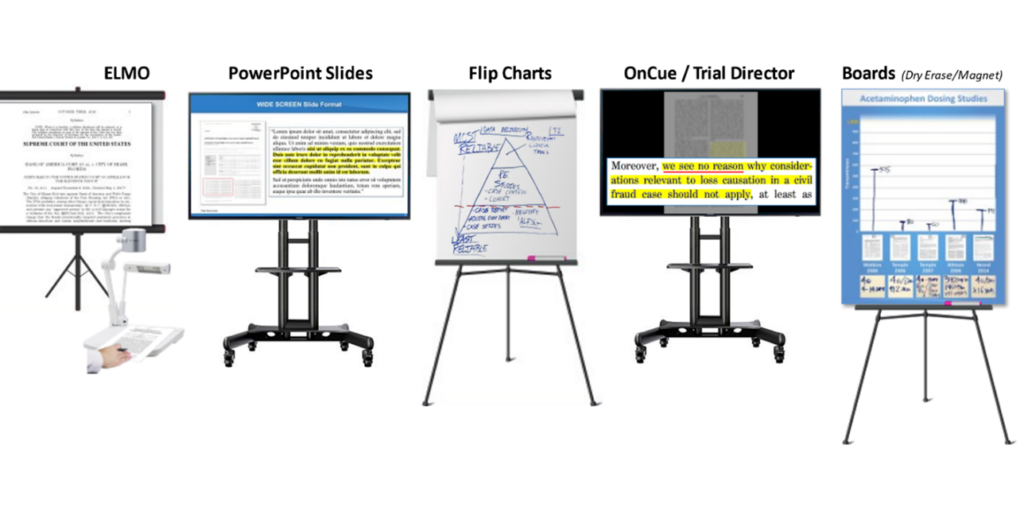How Trial Presentations Enhance Your Argument and Persuade Jurors
Trial discussions serve as a pivotal system for enhancing lawful arguments and convincing jurors. The tactical usage of visuals not only makes clear intricate details yet additionally records jurors' focus more successfully than words alone.

Value of Visual Aids
Visual aids play a vital duty in enhancing the performance of trial discussions, as they can dramatically boost target market involvement and retention of info. In the context of a test, where jurors are charged with processing facility info, visual help serve to streamline and clarify bottom lines. Graphes, graphs, and photos can convey information and concepts that might otherwise bewilder or confuse jurors, permitting for a more uncomplicated understanding of the evidence provided.
Furthermore, aesthetic aids help in maintaining juror attention throughout the procedures. By damaging the monotony of spoken testimony, these tools can stress vital debates, making them much more remarkable. Effective visual help can also evoke psychological responses, which can be critical in encouraging jurors to align with the presenter's story.

Crafting Compelling Stories
A compelling narrative is necessary in trial presentations, as it acts as the foundation of effective persuasion. It enables lawyers to weave with each other facts, evidence, and psychological elements into a meaningful tale that reverberates with jurors. This narrative structure enables jurors to comprehend the intricacies of the instance while guiding them with the lawyer's debate.
To craft an engaging narrative, attorneys ought to concentrate on quality and comprehensibility. This involves establishing a clear protagonist-- typically the customer-- and detailing their trip via the occasions concerned. Presenting the facts in a rational sequence improves comprehension and preserves involvement. In addition, using dazzling summaries can develop psychological photos that aid jurors visualize the occasions, making the story extra remarkable.
Furthermore, integrating key motifs throughout the discussion strengthens the core message and aids in retention - trial presentations. The narrative should not just share info yet additionally stimulate a sense of justice, highlighting the stakes involved. Ultimately, a sound story promotes a connection in between the jurors and the situation, positioning the lawyer's disagreement as both legitimate and engaging, thus increasing the chance of a positive decision

Engaging the Court Mentally
Effective court engagement pivots on the attorney's capability to connect with jurors on a psychological level. This connection can significantly affect jurors' perceptions and their utmost decision-making. Utilizing emotional allures enables lawyers to humanize the case, changing abstract lawful ideas right into relatable experiences. By presenting real-life tales or testimonials, attorneys can stimulate empathy and empathy, cultivating a deeper understanding of the problems at risk.
Visual help, such as pictures or videos, check out here can additionally boost psychological engagement, supplying jurors with dazzling representations of the case's human aspects. Crafting a story that highlights the battles and triumphs of the individuals included makes certain that jurors see past the legal arguments and acknowledge the human repercussions of their choices.
In addition, tone and body movement play an important function in sharing feeling. A lawyer's enthusiastic distribution can reverberate with jurors, enhancing their psychological financial investment in the case. It's important to balance emotional charms with accurate evidence, guaranteeing that jurors feel obliged to act while staying grounded in the truth. Ultimately, an emotionally engaged jury is more most likely to be encouraged, making psychological link a crucial element of efficient trial presentations.
Structuring Your Presentation

The body of the discussion must be realistically fractional into bottom lines, each supported by engaging evidence. It is valuable to utilize storytelling methods to weave facts right into a narrative that jurors can conveniently follow. Aesthetic aids, such as graphes and videos, can improve comprehension and interaction, helping to highlight important pieces of proof.
Real-World Study
Analyzing real-world study supplies important understandings right into the art of trial discussions and persuasion. The landmark situation of "O.J. Simpson v. The Individuals of California" shows just how visual aids and engaging stories can sway jury assumptions. The protection team successfully used a strategy that integrated top-level specialist testimonies with multimedia presentations, which astounded jurors and inevitably influenced their decision.
Another noteworthy example is the "McDonald's Coffee Situation," where the plaintiff's attorneys used graphic images of the injuries suffered by Stella Liebeck. trial presentations. This plain visual evidence played an important function in communicating the seriousness of her burns, resulting in a considerable jury award. Such cases show that impactful test discussions commonly rest on the efficient combination of visuals and storytelling to evoke psychological feedbacks from jurors
In addition, the "Casey Anthony Test" highlighted the value of narrative coherence and reliability. The prosecution's failure to develop an engaging timeline reduced their convincing power, underscoring the need of a well-structured discussion. Examining these cases reveals that effective trial presentations call for calculated planning, psychological engagement, and the capacity to reverberate with jurors' values and ideas.
Final Thought
Test presentations dramatically enhance debates and persuade jurors with check out here the strategic use of aesthetic help, compelling stories, and psychological engagement. A well-structured discussion equilibriums emotional charms with valid evidence, eventually reverberating with jurors' worths.